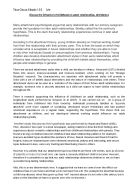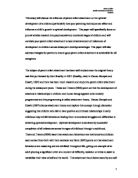There is research supporting the influence of childhood on adult relationship, such as the longitudinal study performed by Simpson et al (2007). It was carried out on on a group of individuals from childhood into their twenties. Individuals previously labelled as 'securely attached' were more capable of socialising, developed secure friendships and had positive emotional experiences on a regular basis, supporting the hypothesis. This shows that our attachment as children, and our developed internal working model influence our adult relationships greatly.
Another study that proves this hypothesis was performed by Hazan and Shaver (1981). They devised a ‘love quiz’ in a local newspaper, asking readers to describe their feelings and experiences about romantic relationships and their childhood relationships with parents. They found a strong correlation between childhood and adult relationship patterns: for example, insecure-avoidant types doubted the existence of love, feared closeness and found it hard to forgive; insecure-resistant types were intensely emotional, jealous and untrusting; and secure types believed in love, were very trusting and liked being close to others.
However it is unlikely that our attachment types as children are fixed. Life events, such as divorce of parents or loss of a loved one, can cause a 'securely attached' child to become 'insecure', therefore it is unrealistic to say that our early relationships determine whether or not we have successful long-lasting relationships.
Also, this is a very deterministic view. It suggests that we have no control over the effect our childhood has on our future and that we do not have free will. (For example the idea that because a child was abused, when they grow up they 'will' become abusers is not only is this untrue, but it plays on the idea that we have no power over who we become.)
Relationships with peers also have an influence on later adult relationships. Peers become more influential as a child progresses into adolescence, playing a significant role in an individual becoming an independent adult, and helping to develop social skills, including those needed for adult relationships. As young people develop into adolescents, they spend less time with parents and family and time with peers increases. They are more likely to experience self disclosure of inner feelings and secrets.
Bee (1995) argues that teenagers use their peer group to make the transition from protection from the family to the real world. Interactions help to develop independence where the teen gradually attains separation from their family. This suggests how they develop a level of emotional and physical intimacy different to that to which they have with their parents.
However gender differences have been found in childhood relationships. Research has shown that girls experience more intimate peer relations than boys, and often report feelings of care and security in their relationships with other girls. In contrast, boys’ peer relationships are usually more competitive. Therefore, we cannot generalise about the effects of childhood peer interactions as experiences are often very different.
Also, many studies of adolescent relationships have relied on small samples from once school or city, usually in the US. A major disadvantage of such samples is that it doesn’t adequately represent relationships in other areas and cultures. Therefore, it is difficult to generalise findings, especially to non-Western cultures.
Overall there are many suggestions as to how childhood, (the effects of peer relationships and parent-child relationships,) can affect our future adult relationships, and although there is various evidence supporting this, it is too reductionist to suggest that childhood experiences is the only factor that impacts possible relationships, as there are others such as life events and environmental factors.
1.









